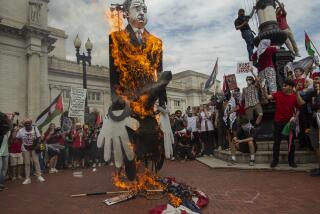Protestant March Ends in Anger, Not Violence
PORTADOWN, Northern Ireland â Barbed wire and steel barricades, bad weather and public fatigue combined to ensure that the most contentious parade of Northern Irelandâs âmarching seasonâ ended Sunday without the violence of years past.
Hundreds of members of the Protestant Orange Order, dressed in their trademark black suits, orange sashes and bowler hats, held their annual march to church in the hamlet of Drumcree and, after the service, angrily protested a ban on their traditional parade route through a Roman Catholic neighborhood.
They raged at Catholics, called Protestant First Minister David Trimble âa traitorâ for failing to support their cause and promised disruptive demonstrations today.
Then the clouds let loose a tremendous rainstorm and most of the protesters went home.
Unrest did resume after dark in a few hard-line Protestant neighborhoods. Rioters hurled stones at police and set hijacked vehicles ablaze.
Originally a commemoration of Northern Irish soldiers who died in the Battle of the Somme during World War I, the Drumcree parade has become a ritual of sectarian intolerance in which Protestant and Catholic hard-liners both take a stand in the name of their own civil rights.
The Orange Order marchers, frustrated that the pro-British Protestant majority is losing its historical lock on power in Northern Ireland, insist that they have a right to walk âthe queenâs highwayâ--any public thoroughfare in the United Kingdom.
The Catholics âare getting everything, and it doesnât matter what they get, they want more and more,â said Gregory Ioannides, 35, who turned out to support the Orangemen with his mother and 7-year-old daughter.
âThis is not about a march. It is about our life and about terrorists in power,â said the eldest Ioannides, referring to the fact that members of the Irish Republican Armyâs political wing, Sinn Fein, are in government with Protestants.
Catholic residents of the contested Garvaghy Road, meanwhile, insist that the issue is equal rights, not right of way. Protestants forced them into ghettos, they say, and now have no right to march through without negotiating the terms.
âThey say no talk before they walk. They want to negotiate once theyâve gotten what they wanted,â said Brid Rogers, the Catholic minister of agriculture in Northern Irelandâs power-sharing government from the Social Democratic and Labor Party.
âThey put us on this road and itâs all we have. Why donât they leave us alone?â said a 68-year-old Catholic woman watching the Protestant parade from behind police lines at St. John the Baptist Church.
Steel barricades partitioned roads between the two communities, and military helicopters hovered overhead. Soldiers stood guard on the ground with guns at the ready to prevent cross-community clashes.
The demonstrators appeared increasingly marginalized, however. Most Northern Ireland residents support the 1998 Good Friday peace accord and the regional Protestant-Catholic government, and they seem to have little stomach for the Drumcree standoff. Many who could afford to have gone on vacation during the volatile marching season; others took cover at home or enjoyed a traditional Sunday lunch with friends.
Even hard-liners who support the Drumcree marchers in spirit failed to turn out in numbers anywhere near as large as in previous years. One reason for this might have been a condemnation of violence by the leader of the Protestant Church of Ireland, Archbishop Robin Eames.
âI see nothing of Jesus Christ in the nightly actions on Drumcree hill or on the roads and streets of Northern Ireland night by night. Evidence of paramilitary involvement at Drumcree and in the disgraceful exhibit of masked men firing shots in Portadown has removed any integrity this protest may have had,â Eames said.
Fear of escalating violence also might have contributed to the limited turnout. Early Sunday, a 250-pound car bomb exploded outside a police station in Stewartstown, about 15 miles from Drumcree, and police said they suspected that an IRA breakaway group was responsible.
Meanwhile, rumors circulated in the press that Protestant paramilitary groups planned to âkill a Catholic a dayâ if they did not get their way at Drumcree.
The appearance in Drumcree on Friday of Johnny Adair, a Protestant paramilitary man and former prisoner accused of killing Catholics, added to the tension. There is concern here that a power struggle among Protestant paramilitary groups competing for control of the streets and, reportedly, of the local drug trade might turn violent.
Sunday Tribune newspaper columnist Ed Moloney said there might have been another reason for the low turnout.
âSo far, it seems that political fatigue has won out over political passion,â he wrote.
Harold Gracey, leader of the Portadown District Orange Lodge, tried to light a fire under those old sectarian passions.
âOur cause is just, our stand is honorable, our protest dignified,â Gracey said. âI say to our people, continue.â
He urged peaceful, if disruptive, protests today, but refused to condemn the violent demonstrations of the past week and called Protestants opposed to the Orange protest âtraitors to their religion.â
Heavy security measures remained in place.
More to Read
Sign up for Essential California
The most important California stories and recommendations in your inbox every morning.
You may occasionally receive promotional content from the Los Angeles Times.










